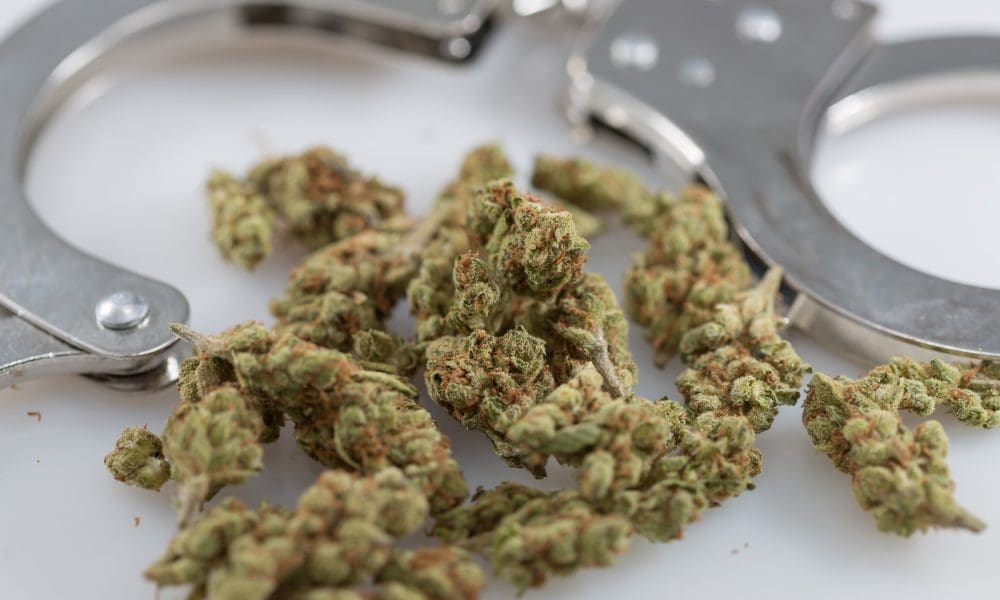“Citizen-initiatives are limited to a single subject which makes it difficult to address lots of different things.”
By Megan Henry, Ohio Capital Journal
Legalizing marijuana in Ohio under Issue 2 would not lead to the automatic expungement for those charged with cannabis offenses.
But the tax revenue from legalizing cannabis could address some criminal justice reform through the social equity and jobs program fund, said Tom Haren, spokesperson for the Coalition to Regulate Marijuana like Alcohol.
“That fund—in addition to the direct investment to disproportionately impacted communities—is designed to fund and steady criminal justice reform efforts including sentencing reform, bail reform, parole reform, record-sealing and expungement efforts,” he said.
Issue 2 is a citizen-initiative that would legalize and regulate the cultivation, manufacturing, testing and the sale of marijuana to Ohioans 21 and up.
“Citizen initiatives are limited to a single subject which makes it difficult to address lots of different things,” Haren said. “We had to be really careful around how Issue 2 was tailored.”
Under Issue 2, Ohioans could buy and possess 2.5 ounces of cannabis flower, which is slightly more than 70 grams. Currently, possessing up to 100 grams of marijuana is a minor misdemeanor that comes with a fine up to $150.
“One thing we have seen over decades when it comes to marijuana prohibition is one small interaction with the criminal justice system makes it harder to get a job, harder to get a loan, harder to get into school, and it tends to leave people with no other options,” Haren said.
Twenty-three states and Washington D.C. have legalized the recreational use and sale of cannabis.
“We’ve seen in every single state that has passed [recreational marijuana], there has been a significant decrease in the number of possession arrests,” said Morgan Fox, political director for National Organization for the Reform of Marijuana Laws.
Marijuana arrests dropped nationwide by 36 percent during 2020, likely due to the COVID-19 pandemic. Other drugs have also been the focus.
“Fentanyl and other opiates have been the top priority for Ohio law enforcement for quite a few years,” Fox said.
Ohio marijuana possession arrests provided to the FBI by the National Incident-Based Reporting System:
2018 — 18,335
2019 — 13,457
2020 — 5,554
2021 — 6,450
President Joe Biden announced last fall he is pardoning all prior federal offenses of simple possession of marijuana. Officials at the time said no one is serving time in federal prison solely for simple marijuana possession. Instead, many people who are imprisoned for marijuana possession and use alone are convicted at the state level.
Expungement
Ohio Gov. Mike DeWine signed a bill into law earlier this year that makes it easier to expunge misdemeanor convictions, including low-level marijuana possession charges.
An application for expungement can be filed six months from final release for minor misdemeanors and one year from final releases for all misdemeanors. An application for expungement can be sent to a local Court of Common Pleas and a judge may call for a hearing with the original prosecutor. Ultimately, the judge will make the final decision to approve or deny the expungement.
Sensible cities
Ohio has 38 cities that have decriminalized marijuana through the Sensible Movement Coalition. Decriminalizing removes the penalties for under 200 grams—meaning no fine, no time or court costs.
“If you get charged and it goes to court, the judge has nothing to charge you under,” said Samantha Farrell, the coalition’s initiative director.
Toledo was the first city in Ohio to decriminalize marijuana in 2015.
War on drugs
Canton Municipal Court Magistrate Derek McClowry shared about his time as a probation officer during the war on drugs in the 1990s during a recent Canton League of Women Voters Issue 2 panel earlier this month.
“Back then the war on drugs was typically crack cocaine but everyone, and I mean everyone, used marijuana,” he said.
As part of his work as a probation officer, he drug tested people multiple times a week and sent them to treatment centers if they tested positive.
“Some would succeed, but most would not and then we would send them to prison,” McClowry said. “I was instrumental in that and I thought I was doing God’s good work. I thought I was fighting the good fight and I thought I was the good guy.”
People would be sent to prison for five to 25 years for smoking marijuana, he said.
“Eventually that pendulum swung a little bit,” McClowry said. “It’s almost decriminalized legislatively but certainly in practice it’s decriminalized… I just don’t think it’s viewed the same way.”
This story was first published by the Ohio Capital Journal.
Most Ohio Lawmakers—Dems And GOP—Think Voters Will Legalize Marijuana At The Ballot, Survey Says
Read More Feedzy

